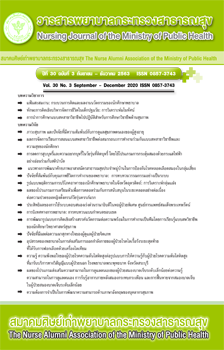Effects of The Self-Care Agency Promoting Program on Knowledge, Self-Care Ability Perceived Post Concussion Symptoms, and Recovery from Brain injury in Patients with Mild Traumatic Brain Injury
Main Article Content
Abstract
The quasi experimental design used was a one group pre-posttest study that aimed to examine the effects of the Self-care agency promoting program on knowledge, self-care ability, perceived post-concussion symptoms (PCS), and recovery from brain injury in patients with mild traumatic brain injury. A sample of 30 patients was selected by purposive sampling. The Self-Care Agency promoting program consisted of 3 processes which were assessment, education and follow up. Data were collected using a patient self-report questionnaire that included personal data, knowledge test, a self-care agency questionnaire, the Rivermead Post concussion Symptom Questionnaire and The Rivermead Head Injury Follow Up Questionnaire. Data were analyzed by Repeated Measures ANOVA, Wilcoxon signed rank test and Friedman test. The results showed that the majority of the experimental group were male, and a mean age of 30.67 year old. After receiving the program, the experimental group had a higher knowledge mean score than before. A number of PCS before receiving the program was three to five symptoms and after receiving the program there were no symptoms. There were significant differences in knowledge, perceived PCS mean score across time, and discharge and recovery from brain injury (p<.05). Although the self-care agency after discharge at four weeks had a higher mean score than after discharge at two weeks, the mean score was not significantly different (p >.05).
The recommendation is that nurses should using the Self-Care Agency promoting program to promoted patient knowledge and self-care ability, and to decrease the number of PCS symptoms and improve recovery from brain injury following discharge.
Article Details
บทความและรายงานวิจัยในวารสารพยาบาลกระทรวงสาธารณสุข เป็นความคิดเห็นของ ผู้เขียน มิใช่ของคณะผู้จัดทำ และมิใช่ความรับผิดชอบของสมาคมศิษย์เก่าพยาบาลกระทรวงสาธารณสุข ซึ่งสามารถนำไปอ้างอิงได้
References
2. Gardner RC, Yaffe K. Epidemiology of mild traumatic brain injury and neurodegenerative disease. Mol Cell Neurosci.2015;66(Pt B):75-80.
3. Ahman S, Saveman BI, Styrke J, Bjornstig U, Stalnacke BM. Long-term follow-up of patients with mild traumatic brain injury: a mixed-method study. J Rehabil Med.2013;45(8):758-64.
20. Tangwongchai S, Charernboon T, Phanasathit M, et al. The validity of thai version of the montreal cognitive assessment (MoCA-T). Dement Neuropsychol.2009;3:172.
21. Eyres S, Carey A, Gilworth G, Neumann V, Tennant A. Construct validity and reliability of the Rivermead Post-Concussion Symptoms Questionnaire. Clinical rehabilitation.2005;19(8):878-87.
22. Premsai T. (2003). Follow up study of patient’s adaptation after mild head injury. [Master thesis]. Bangkok: Mahidol University. (in Thai).
23. King NS, Crawford S, Wenden FJ, Moss NEG, Wade DT. The rivermead post concussion symptoms questionnaire: a measure of symptoms commonly experienced after head injury and its reliability.J Neurol 1995;242:587-92.
24. Deethongkham D. Relationship between Post concussion symptoms and functional performance in Patients with mild traumatic brain injury. [Master thesis]. Chonburi: Burapha University.2015. (in Thai).
25. Niramon P, Sucamvang K, Tungamnuay T. Effect of educational program for caregivers on caring of patient with minor head injury. [Master thesis]. Chiang Mai, Chiang Mai University.2005. (in Thai).
26. Komgorm A, Nantachaipan P, Srisupan W, Tawannarit, Tonmuhayakul O & Potjanamart C. Meta-analysis of surgical patient Instruction in Thailand. [Master thesis]. Chiang Mai, Chiang Mai University.2002 (in Thai).
27. Bergman K, Louis S. Discharge instructions for concussion: are we meeting the patient needs? J Trauma Nurs.2016;23(6)327-33. (in Thai).
28. Miller Phillips M, Reddy CC. Managing patients with prolonged recovery following concussion. Phys Med Rehabil Clin N Am. 2016;27(2):455-74.
29. Tummee S. Predicting factors to quality of life in patients with mild traumatic brain injury after discharge from hospital at the first 2 weeks.[Master thesis]. Bangkok: Mahidol university;2015. (in Thai).

